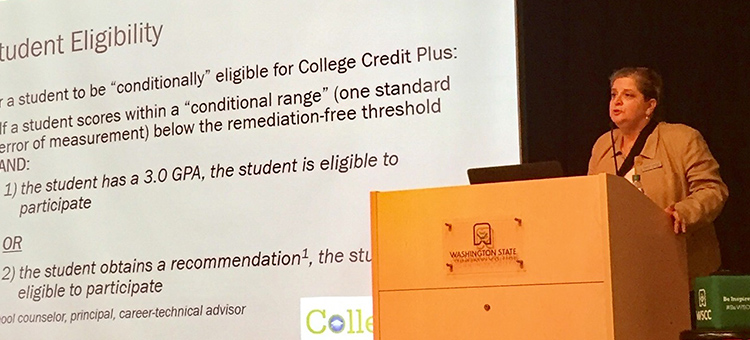MARIETTA, OH (Feb. 23, 2018)–Washington State College of Ohio (WSCO) hosted a College Credit Plus (CCP) Around the State meeting on Wednesday, February 21, which featured a presentation by the Ohio Department of Higher Education (ODHE) and the Ohio Department of Education (ODE). Approximately 70 people from seventeen high schools and ten colleges attended the event.
The meeting was the first of five scheduled to be held around Ohio and directed specifically toward high school guidance counselors, principals, and college CCP advisors/staff. Dr. Larisa Harper, Director of College Credit Plus, addressed upcoming changes to the CCP program. These changes, brought about by House Bill 49, will go into effect for Summer 2018 enrollment.
“The idea is to come out and talk with professionals in the field to ensure they are aware of the changes for College Credit Plus for this upcoming academic year,” said Dr. Harper. “It also gives an opportunity to dialogue questions and concerns to dispel any rumors and clarify things.”
Three major topics of discussion were the changes made to student eligibility, course eligibility, and underperforming students. Dr. Harper pointed out that changes to student eligibility are more incremental—“We’ve learned over the first two years where we needed to improve that process,” she explained. However, course eligibility and underperforming students are new subjects. “And since those are brand new,” said Dr. Harper, “we all are learning from them and are all taking on new responsibilities for them. Those may take the biggest adjustment to learn how they will work over the next year or so.”
Under the new changes, students must first meet overall CCP eligibility requirements to participate in the program. Once those requirements are met, students need to complete the admission process and course placement requirements for the college they have selected. During the meeting, Dr. Harper also outlined changes to course eligibility. Among the list of ineligible courses are physical education and study abroad courses. As an alternative, high school students may opt to take an ineligible course if they choose to self-pay.
The meeting also highlighted the new requirements for underperforming students. According to the 2016-17 CCP Annual Report, more than 68,000 students participated in College Credit Plus courses across the state. Of those who participated, 91% of students earned a passing grade and the average GPA for CCP students was 3.29. The new underperforming student rule will help address the group of students who may have struggled with their college course. Harper reviewed the changes which include a new CCP probation for students earning less than a 2.0 cumulative GPA or withdrawing from two or more courses in the same term.
Debbie Gurtis, Assistant Director of Advising and CCP Coordinator at WSCO, said she doesn’t anticipate any issues with implementing the updates at Washington State. “We are up to speed with the new CCP requirements,” she confirmed. “It’s just a matter of reviewing our processes and ensuring that we are communicating with our [high school] partners.”
Secondary schools will also be impacted by the changes. Mary Beth Shultz, school counselor at Fort Frye High School, acknowledged the challenges these changes bring about. One portion of the new CCP rules that she found especially beneficial is the underperforming student requirement, specifically CCP probation. “Personally, I like the accountability with the CCP probation.”
For more than 45 years, Washington State College of Ohio has fueled the community’s future through education. We work to make a positive impact by providing opportunities for growth. Whether you are a recent high school graduate or an adult student looking to enrich your life, we cultivate pathways to guide you toward future growth. Be inspired. Be WSCO. For more information about Washington State College of Ohio, visit www.wscc.edu or call 740.374.8716.





